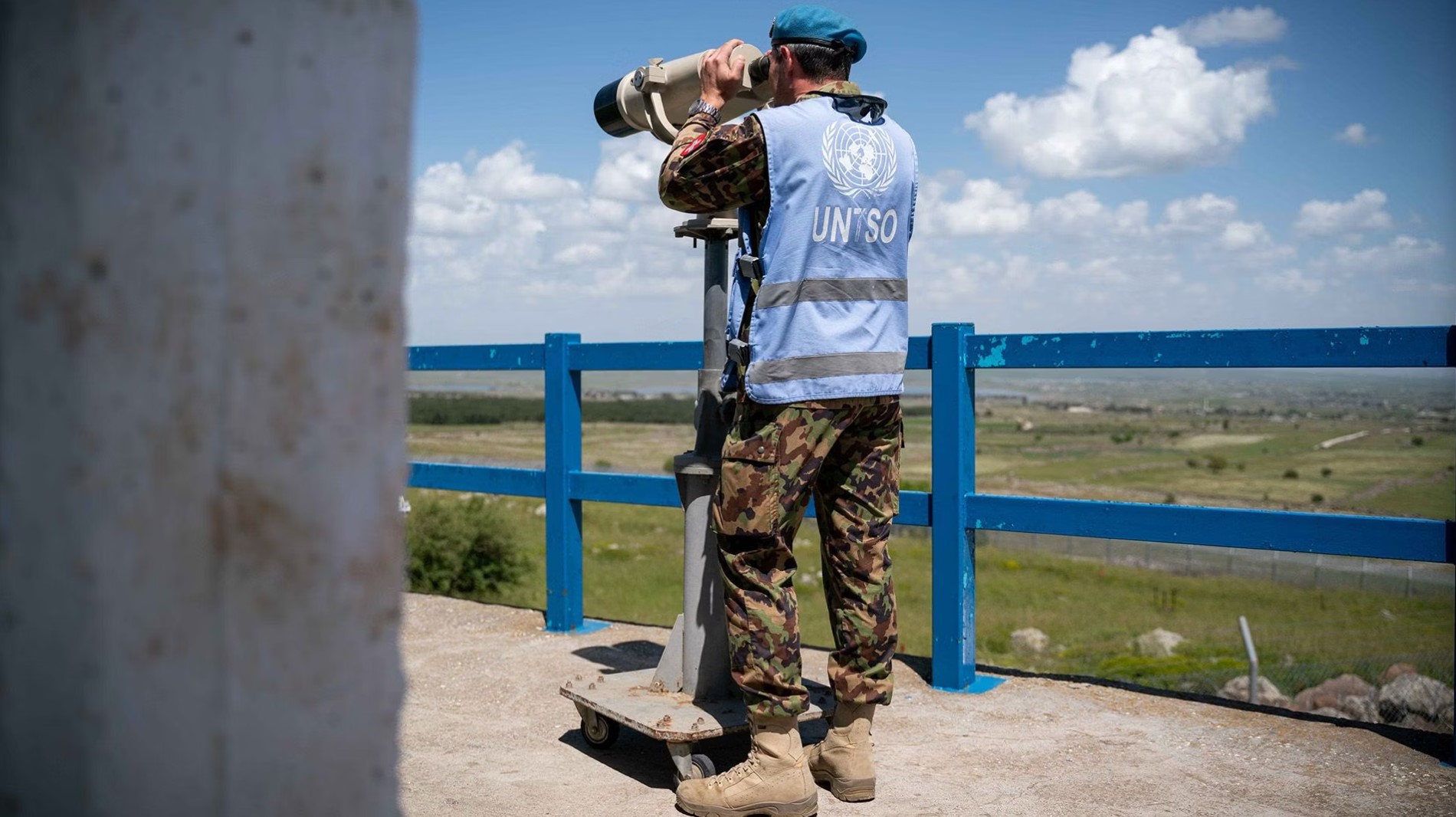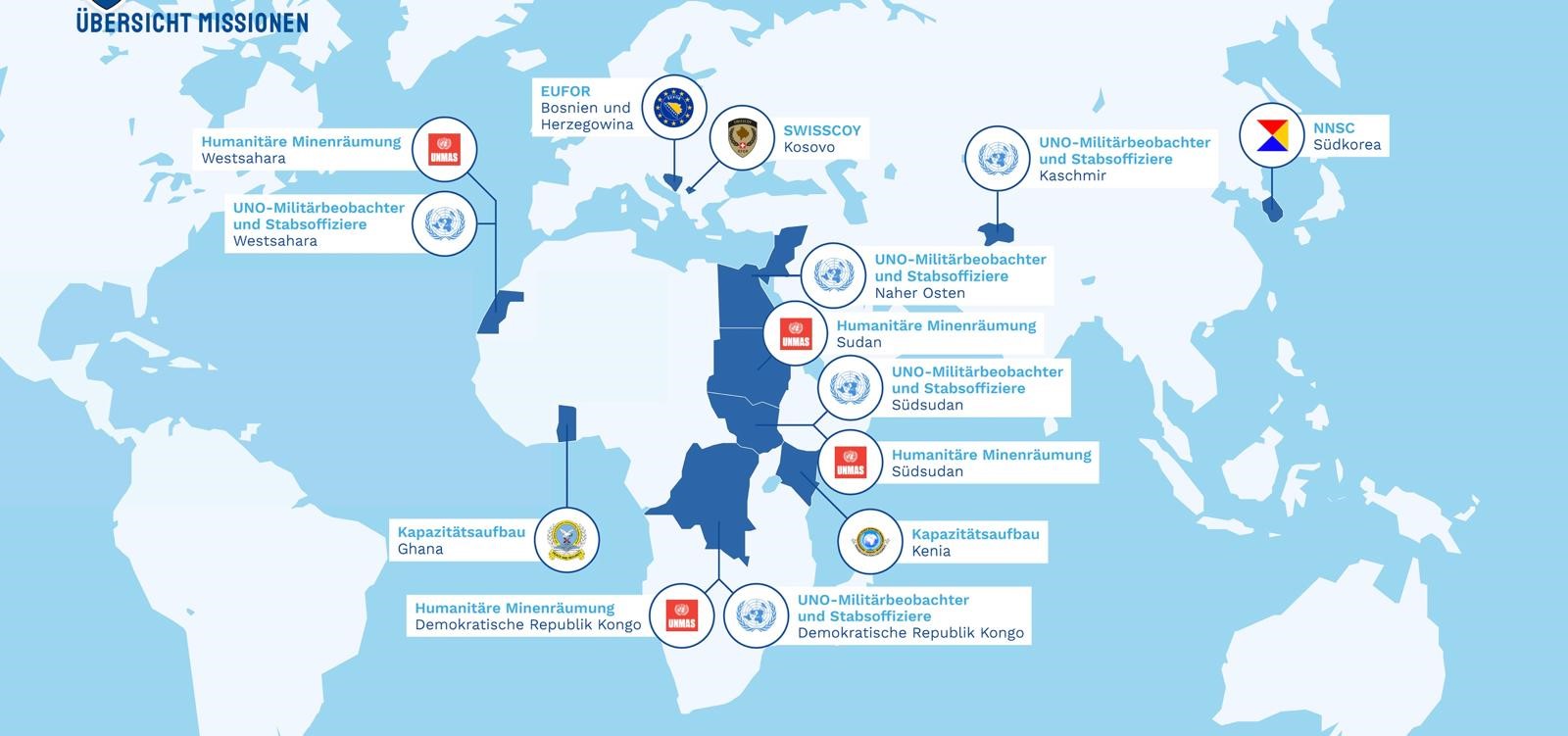Picture: https://www.peace-support.ch/missionen
Peace promotion as a third mission of the army – Cédric Hengy
Even though Switzerland abstains from participating in wars as part of its neutrality, it still plays a certain role in war and crisis regions. Switzerland’s neutrality is primarily humanitarian in nature and is oriented towards peace issues. In this regard, it is in line with the tradition of good offices and humanitarian aid.
The Swiss Army has three core missions, which are enshrined in the Federal Constitution. Firstly, it is responsible for defending the country and its population against attacks, and secondly, it is to support civilian authorities when their resources are insufficient. Thirdly, the army is tasked with promoting peace at the international level. The Swiss Army actively engages in peace promotion worldwide. The approximately 300 men and women who voluntarily participate as army personnel in various missions carry out different tasks depending on the type and location of the mission.”
What is SWISSINT?
The army mission of “peace promotion” is carried out by the competence center SWISSINT (Swiss Armed Forces International Command) in Stans-Oberdorf (Canton Nidwalden). As such, SWISSINT is responsible for recruitment and personnel management, logistics, financial planning, mission-specific training, national leadership during operations, evaluation, and public relations. Currently, SWISSINT is involved in 14 peace-promoting missions on four continents on behalf of the United Nations and the Organization for Security and Co-operation in Europe (OSCE).
Neutral Nations Supervisory Commission for the Armistice in Korea (NNSC)
The oldest peace-promoting mission of Switzerland is the Neutral Nations Supervisory Commission for the Armistice in Korea (NNSC). In 1953, following the signing of the armistice, the Swiss Federal Council dispatched around 150 armed army personnel to Korea. Today, five Swiss officers and five Swedish officers are deployed on this mission, stationed in Panmunjom just south of the military demarcation line. The main task of the NNSC remains to ensure the monitoring of the armistice agreement of 1953 between North and South Korea.
SWISSCOY
SWISSCOY (Swiss Company) is often associated with SWISSINT and has been deployed in Kosovo since 1999. It is the largest commitment of the Swiss Army in the context of peace promotion thus far. Up to 215 army personnel are deployed in support of the Kosovo Force (KFOR), a multinational military formation established under NATO leadership after 1999. Their main contribution to the mission is ensuring a safe and stable environment and maintaining freedom of movement for all people in Kosovo. Additionally, SWISSCOY provides services in road and air transport, as well as in support of military police and ordnance disposal.
Although Switzerland’s engagement within KFOR is considered an important contribution to European security, the SWISSCOY mission is not without controversy. It is most strongly criticized by the organization Pro-Schweiz, which is close to the Swiss People’s Party (SVP). Their president, Stephan Rietiker, views the deployment and stationing of troops abroad as incompatible with Swiss neutrality.
KFOR
The Balkans are characterized by ethnic, cultural, and religious differences. After a period of stability following World War II, these differences resurfaced with the breakup of Yugoslavia in 1991, leading to wars of independence. In the late 1990s, ethnic conflicts escalated in the then-Serbian province of Kosovo to such an extent that NATO launched Operation “Allied Force” against Yugoslav and Serbian forces under President Milošević in March 1999. Following the successful conclusion of the operation, the military-technical agreement between NATO and the former Federal Republic of Yugoslavia came into effect on June 9th, 1999, regulating the withdrawal of Yugoslav troops from Kosovo.
On June 10th, 1999, the UN Security Council established the prerequisites for the deployment of the Kosovo Force (KFOR) under NATO leadership with Resolution 1244, also laying the foundation for a civilian transitional administration in Kosovo. On February 17, 2008, Kosovo unilaterally declared independence and adopted its own constitution in June 2008. Even after the declaration of independence, KFOR remained in the country with the approval of the Kosovar government. However, Serbia and a number of other countries, including EU and NATO members, still do not recognize Kosovo as sovereign. Switzerland, on the other hand, recognized Kosovo’s independence from Serbia on February 27, 2008.
The multinational KFOR mission is tasked with supporting and militarily securing the development of a democratic, rule-of-law, peaceful, and multi-ethnic Kosovo, as well as guaranteeing freedom of movement for all throughout Kosovo. As these tasks have increasingly been taken over by local security forces, KFOR primarily monitors the development of democratic security structures and works closely with local authorities and international organizations.
Since its inception, KFOR’s tasks have included supporting the return or relocation of displaced persons and refugees, reconstruction and mine clearance, protection of cultural heritage, border security, and prevention of cross-border arms smuggling.
As of January 2024, KFOR is comprised of troops from 28 countries, totalling 4443 soldiers, with Italy providing the largest contingent by far (1322). Member countries include most NATO states (except Estonia, Slovakia, Spain, Portugal, Norway, the Netherlands, Luxembourg, Iceland, and Belgium), as well as Switzerland, Austria, Moldova, Armenia, and Ireland. Since October 2023, Turkish Major General Özkan Ulutas has led the KFOR mission.
Sources:
https://www.armee.ch/de/ueber-armee-auftrag
https://www.peace-support.ch/missionen
https://www.vtg.admin.ch/de/nnsc
https://www.swissinfo.ch/ger/wirtschaft/das-schweizer-militaer-der-kosovo-und-diefrage-der-neutralitaet/48996380
https://jfcnaples.nato.int/kfor/about-us/historyhttps://jfcnaples.nato.int/kfor/about-us/history/tasks

Picture: https://www.vtg.admin.ch/de/uno
Swiss military observers deployed for international peace promotion
Since 1990, Switzerland has been participating in UN peacekeeping missions with military observers and liaison officers. All deployments of the Swiss Army in support of UN peacekeeping efforts are based on corresponding UN mandates. Additionally, the consent of the parties involved in the conflict is required for a peacekeeping mission; without it, no mandate can be established. Swiss military personnel serve at the UN as so-called blue berets, unlike their armed counterparts the Blue helmets, they are unarmed. Since 2004, the Swiss Armed Forces International Command (SWISSINT) has been responsible for training military observers for peacekeeping missions abroad. Swiss military observers are currently deployed in the Middle East, the Democratic Republic of Congo, South Sudan, Kashmir, and Western Sahara on UN peacekeeping missions. Their tasks include observing and reporting events that violate the mission’s mandate. They also conduct patrols in the operational area to monitor sensitive regions and engage in information exchange with locals. To obtain a comprehensive understanding of the security situation in the region, military observers also conduct inspections of local armed forces to ensure that troops, weapons, and ammunition are used under the mandate.
The United Nations Truce Supervision Organization (UNTSO) Peace Mission
In 2023, fourteen Swiss officers with the rank of captain or higher participated in the UNTSO (United Nations Truce Supervision Organization) peace mission. UNTSO is the oldest UN peace mission, established in 1948.
UNTSO was established in response to the Arab-Israeli war in 1948 after the UN declared a ceasefire between the conflicting parties. Military observers were then deployed to monitor the ceasefire agreements between Israel and neighbouring states. Following the 1974 Yom Kippur War, a new ceasefire agreement was signed between Israel and Syria. This agreement established a demilitarized zone to separate the warring forces and limited the number of troops and types of weapons allowed in the zone.
A total of 27 nations contribute to UNTSO with 153 military personnel stationed in Israel, Lebanon, Egypt, Syria, and Jordan, operating under the UNTSO mandate. An important observation post is located on the Israeli-occupied Golan Heights. Military observers always work in pairs with different nationalities to ensure impartial reporting.
During their deployment, military observers face the risk of being caught between the frontlines of the conflicting parties. Incidents often occur on the Golan Heights. Another threat comes from landmines and unexploded ordnance. Since 1948, 51 military observers serving with UNTSO have lost their lives.
Sources:
https://www.swissinfo.ch/ger/wirtschaft/schweizer-militaerbeobachter-im-nahen-osten/48541956
https://www.peace-support.ch/missionen/uno-militaerbeobachter-und-stabsoffiziere
https://www.vtg.admin.ch/de/uno
https://untso.unmissions.org/untso-operations

